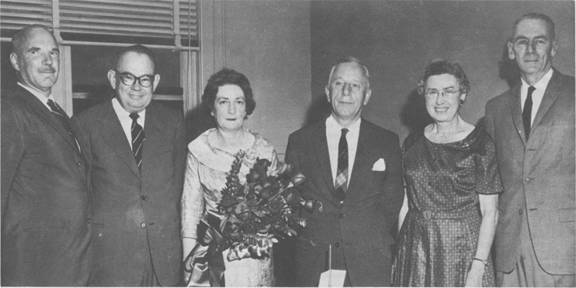1962
Charles James Acton
Internationally Recognized Radio Specialist Retires

Seen at a farewell gathering for retiring Superintendent of Radio Regulations and International Agreements Charles J. Acton (third from right) were, from left, H. R.
Newcombe, superintendent of radio authorization and enforcement; W. A. Caton,
controller of radio regulations; Mrs. Acton; Mr. Acton; Miss A. B. Warner,
statistics and frequency records; and F. T. Nixon, director of the
telecommunications and electronics branch.

Charles James Acton, a World War I radio operator who became one of the
world's best known specialists in international radio regulations, retired at
the end of July.
As superintendent of radio regulations and international agreements in the
telecommunications and electronics branch since 1954, he has spent the past 25
years making sure that Canada receives its fair share of the use of the radio
spectrum.
In 1959 Mr. Acton brought singular honor to Canada when he
was unanimously elected chairman of one of the largest technical conferences in
history, the 117-nation Seventh Administrative Radio Conference of the
International Telecommunications Union (ITU) at Geneva.
Mr. Acton became a government radio operator in 1919 and
spent the next four years at West Coast radio stations. He returned to Ottawa as
a senior radio operator in 1923 and became a radio inspector in 1930.
At the beginning of World War II Mr.
Acton assumed the responsibility for allied general frequency co-operation in
the area of Canada and the Northwest Atlantic.
After the war the use of radio increased to a point where international regulations had to be revised. In 1947 Mr. Acton was a member of the Canadian delegation
to the ITU conference in Atlantic City where these revisions were carried out.
He subsequently attended such international conferences as
the Provisional Frequency Registration Board, Geneva, 1948-49; the High
Frequency Broadcasting Conference, Mexico City, 1948-49; the Extraordinary
Administrative Radio Conference, Geneva, 1951, and the Buenos Aires
Plenipotentiary Conference in 1952.
He also represented Canada for many
years on the ITU Administrative Council, which meets annually in Geneva, and was
chairman of that body in 1954.
A native of England, Mr. Acton came
to Canada at an early age and settled in Brockville. He now lives in Ottawa.
Mr. Acton received a portable television set as a farewell gift from his many
friends and associates. Among those speaking on behalf of the department on his
last day of work were F. J. Nixon, director of the telecommunications and
electronics branch; W. A. Caton, controller of radio regulations; and H. R. Newcombe, superintendent of radio authorization and enforcement.

